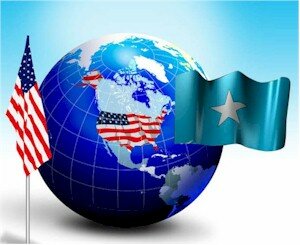
Bartamaha (COLUMBUS, Ohio):- Somalia must rekindle its diplomatic relationship with the United States to help rebuild the country and protect the security of both countries, the first Somali diplomat assigned to the United States in two decades said in an interview.
Abukar Arman, appointed the Somali U.S. special envoy on Feb. 6, plans to re-establish the ties that disintegrated during clan warfare that tore Somalia apart in the early 1990s and culminated in a 1993 battle in Mogadishu that killed 18 U.S. soldiers and hundreds of Somalis.
“The world has changed – the lack of security in one area does not mean it is contained in that neighborhood,” Arman told The Associated Press. “Everything that happens on one side of the world indeed affects everywhere else.”
Arman also wants to work with the tens of thousands of Somali immigrants living in several U.S. cities, including Columbus, Minneapolis, Seattle and Portland, Maine. At least 20 young Somalis from the Minneapolis area were allegedly recruited by terrorist groups in Somalia, and Arman says he wants to work with Somali groups here to address that problem.
“Finding ways to address these issues without creating more problems will be helpful to both countries and both peoples,” Arman said.
The appointment of Arman, 50, of Columbus, illustrates the extent to which Somalia has become a country many of whose citizens are scattered unwillingly across the globe.
Arman, until recently a writer and a work force development instructor for the city schools, came to the U.S. in 1980 and has lived in Columbus since 1994. He has blogged for the Huffington Post and has written about Islamic issues for several publications, including Aljazeera and The American Muslim.
The civil war ended Arman’s plans to return home in the late 1980s after attending Houston Baptist University. He is married with four children. He plans to commute between Columbus and Washington, D.C.
Arman recognizes the challenges before him. Somalia has not had an effective government in almost two decades. The current administration controls only a small section of the capital with the help of some 5,000 African Union peacekeepers. The government is preparing an offensive to try to wrest back control of much of the capital from the insurgent group al-Shabab, which holds most of southern and central Somalia.
Somali pirates have seized control of several ships off the country’s coast in recent years, holding crew members hostage for ransom.
Somali president Sheik Sharif Sheik Ahmed visited several U.S. cities with large Somali populations last fall, including Columbus, trying to drum up support for his beleaguered government and to ask Somali immigrants for help.
Arman has an almost impossible task before him given the country’s problems, said Ahmed Samatar, an international affairs professor at Macalester College in St. Paul, Minn.
“The transitional federal government under Sherif has no legs to stand on,” Samatar said. “What then would an ambassador represent given that?”
Arman says people who say Somalia’s problems are too great to try to fix are guilty of lazy thinking.
“We’ve tried that line for the last 20 years – it didn’t get us anywhere,” he said. “It’s a tall order, but somebody has to do it, somebody has to march with confidence towards that goal.”
—————
By ANDREW WELSH-HUGGINS
ASSOCIATED PRESS WRITER



